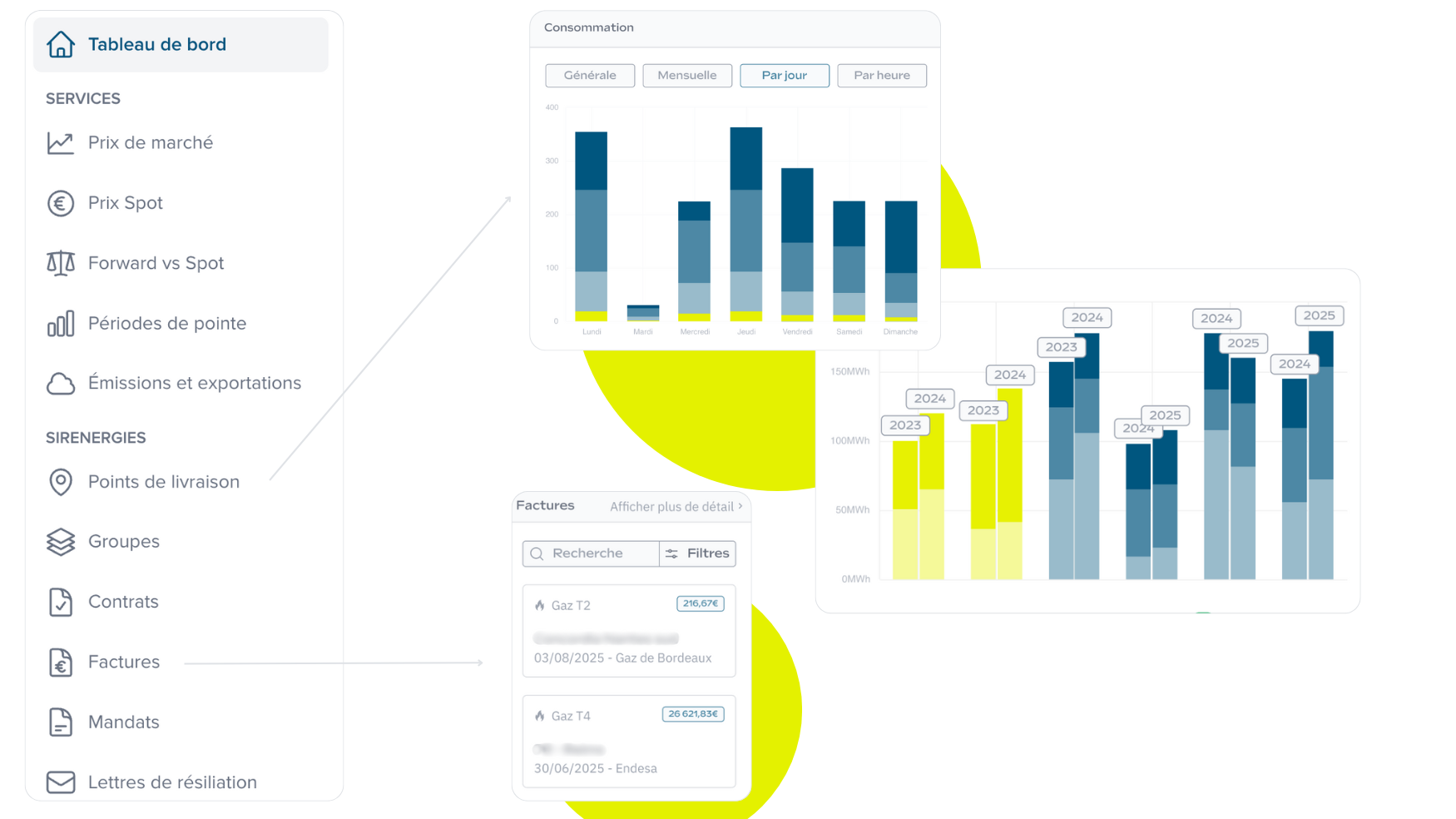

January 7, 2026
6
Min reading

Corporate Social Responsibility (CSR) invites each company to find a subtle balance between economic profitability, environmental commitment and social responsibility.
At the crossroads of these three issues, energy management contributes to meeting this challenge, which at first glance is contradictory.
How to integrate energy management into the CSR strategy of your medium-sized company (ETI)?
How to activate this powerful strategic lever to maximize your CSR performance, both environmentally, socially and economically?
With Sirenergies, implement concrete solutions to optimize your energy management and propel your company's CSR approach.
Today, a company's performance is no longer measured solely by its financial profitability. Its environmental and social performance is also carefully monitored.
CSR is becoming strategic.
At the heart of the approach, energy management plays a transversal role.
Corporate Social Responsibility (CSR) — also called Corporate Social Responsibility — refers to the approach by which a company seeks to control the negative effects of its activities on the environment and society, while maintaining its economic profitability.

CSR is based on an international reference framework: ISO 26000 standard.
Among the seven areas of action covered by CSR, the environment is at the forefront.
A voluntary approach left to the initiative of each company, CSR is becoming essential in the face of the climate emergency, social pressure and the multiplication of norms.
Many regulations indirectly require companies to apply CSR principles.
In France, the Grenelle II law of 2010, supplemented by the NRE law (New Economic Regulations), requires large companies to publish an extra-financial performance statement (DPEF). This extra-financial reporting requirement is reinforced by the European CSRD directive (Corporate Sustainability Reporting Directive), integrating ESG criteria (Environmental, Social and Governance).
Also, the Tertiary decree and the obligation to Greenhouse gas emissions balance require certain companies to act on the environment by reducing their energy consumption and carbon footprint.
Even if your ETI is not concerned by these regulatory requirements, the pressure from stakeholders in terms of sustainable development is growing.
Customers, investors, business partners, employees: all expect more transparency, responsibility and commitment from companies.
CSR is becoming a selection criterion in purchasing and investment decisions, tenders or commercial partnerships.
Energy management plays a transversal role for the CSR of your company.
In addition to energy savings, it:
Energy management reinforces the CSR performance of your ETI by acting on three pillars of the approach: the environment, the economy and the social.
Energy management is a powerful and direct lever to reduce environmental impact of your business.
By combining energy sobriety, energy efficiency and renewable energies, it acts concretely to:
Effective energy management is also a economic performance motor. In addition to controlling consumption, it strengthens your competitiveness thanks to:
What better theme to unite your employees than energy and the environment?
Energy management is not limited to technical choices. Integrating energy management into your CSR strategy mobilizes your employees and develops your corporate culture.
This contributes to:
Maximizing the CSR performance of your ETI requires a structured approach, including three best practices to adopt without delay.
THEdetailed analysis of energy consumption is the first step in an effective energy management strategy.
To carry out this diagnosis, the energy audit is your best ally.
This structuring tool provides an exhaustive vision, Objective and Encrypted of the energy situation of your ETI. The audit detects areas for energy savings, identifies malfunctions and helps to build a prioritized action plan adapted to your challenges.
In particular, the energy audit highlights the the most cost-effective, low-cost and high-impact measures, such as adjusting heating systems or airconditioning, the installation of presence detectors for lighting or the awareness-raising of employees about eco-gestures.
Simple to implement, these actions launch the momentum, with immediate and visible effects: team motivation, visibility to your environmental commitment, rapid savings freeing up resources for more structuring energy transition actions.
Did you know that?
Sirenergies offers businesses bespoke energy diagnostics.
Our experts use your data to:
- understand your electricity and gas consumption,
- detect The anomalies
- spot The most energy-consuming consumer stations
- implement concrete actions to make you save money.
We call you back
Energy sobriety is not just about consuming less. She invites to rethinking needs. Combining simple actions and thoughtful choices makes your company's CSR performance take off.
Concretely, in all internal processes and purchases, it's about asking yourself about the need to consume energy : do all spaces have to be heated to the same temperature? Does some equipment continue to function after the departure of your employees? Are there devices that are as efficient, but with lower energy consumption? Etc.
In a CSR approach, every choice countsthroughout the supply chain. Selecting a supplier is not trivial. Its commitment to a decarbonization process influences your extra-financial results and the scope 3 of your carbon balance.
How can you know the efficiency of your energy management without measuring it?
Too often underestimated due to lack of time or resources, the regular follow-up of your action plan allows you to adjust the measures and reorient your CSR strategy.
To accurately measure your progress, your energy performance indicators (EPIs) must be relevant, clear and comparable (energy consumption per m² or per unit produced, CO2 emissions avoided, percentage of renewable energy in your energy mix...).
Manage your energy with Pilott:
With Pilott, a turnkey digital platform by Sirenergies,
- Visualize your consumption on D+1
- Compare your performances over time
- Access to the detailed history of your invoices

To conclude...
Energy management now goes beyond the simple objective of reducing costs. It is a real CSR performance engine for your ETI. Cross-cutting, it combines economic profitability, environmental commitment and social responsibility. By integrating energy management into your CSR strategy, you not only reduce your carbon impact, but you also boost the profitability of your company and unite your employees.
From energy audits to the optimization of consumption, including the management of energy purchases and contracts, each choice counts. At each stage, Sirenergies combines human expertise with digital power to structure your energy management and strengthen your CSR approach.

.png)

La réussite d'un projet collectif énergie repose sur trois piliers fondamentaux :

